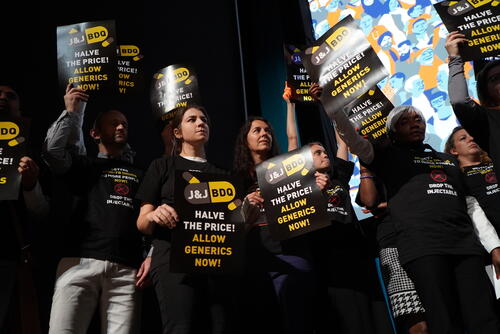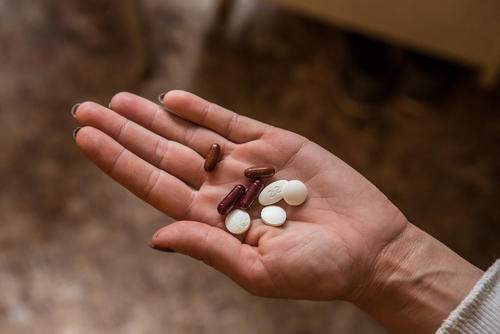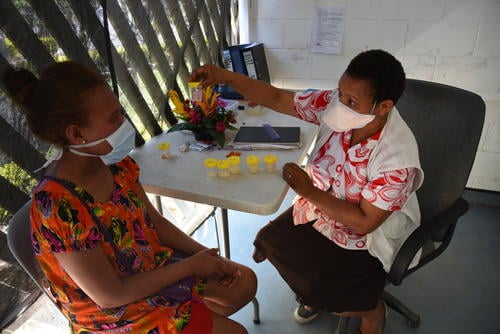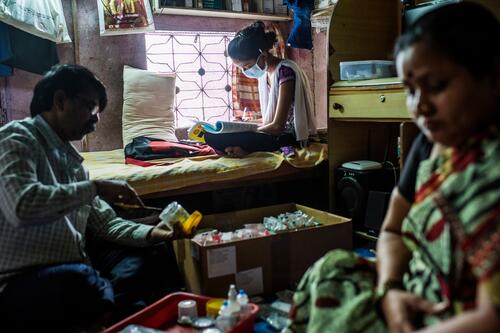- TB survivors file legal challenge against a patent in India on TB drug bedaquiline
- Patent prevents affordable generic versions of being produced; a successful patent challenge would lift the patent four years early
- Most people with drug-resistant TB endure two years of treatment on drugs that can leave them deaf or suicidal; bedaquiline would minimise these effects
Mumbai/Cape Town — Médecins Sans Frontières (MSF) is supporting a patent challenge filed in India this week by two tuberculosis survivors, to prevent pharmaceutical corporation Johnson & Johnson (J&J) from extending its monopoly on the tuberculosis drug bedaquiline.
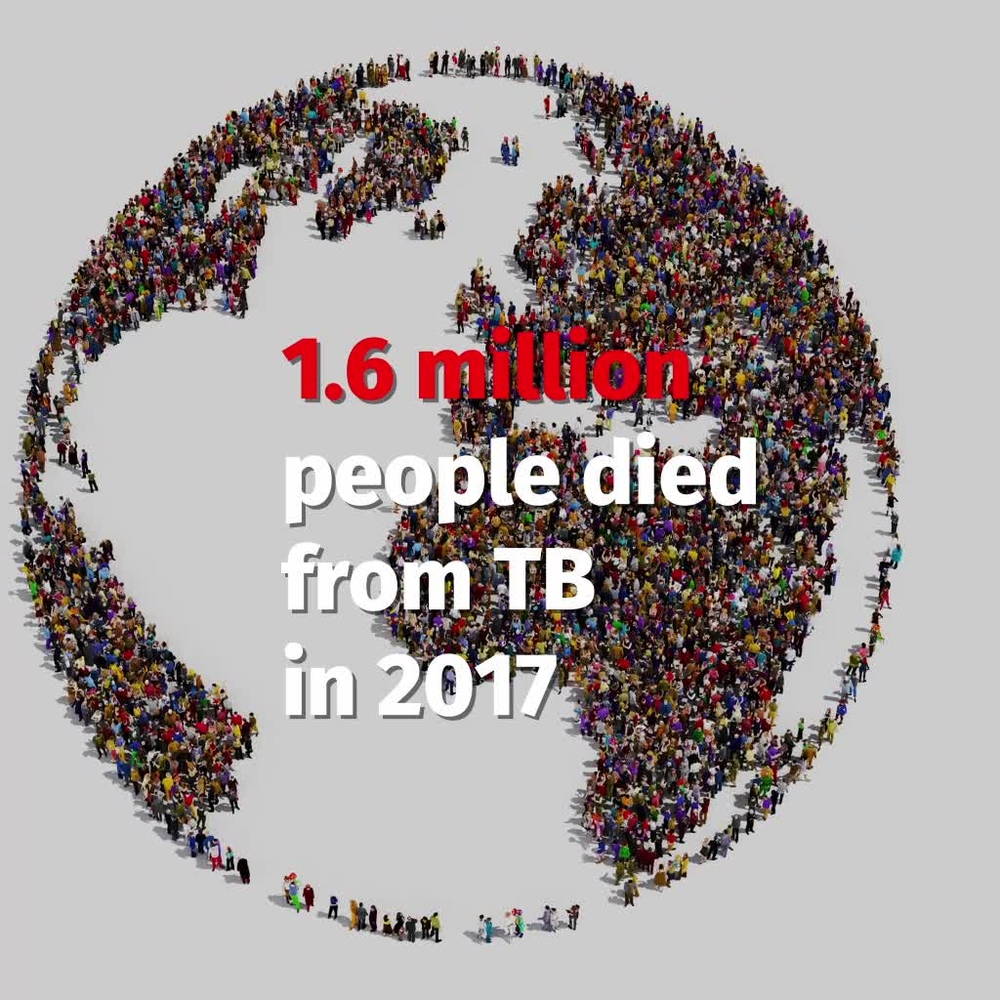
Johnson & Johnson's lifesaving TB drug which people can't access
Nandita Venkatesan from Mumbai, India and Phumeza Tisile from Khayelitsha, South Africa, who filed the patent challenge at the Mumbai Patent Office, both survived drug-resistant TB (DR-TB), but lost their hearing because of the toxicity of the treatment. They are now fighting to ensure that newer drugs like bedaquiline – which are safer and more effective – are made affordable and accessible to everybody with DR-TB, to replace painful and toxic drugs that need to be injected.
558,000
558,
25 %
25%
55 %
55%
An estimated 558,000 people developed DR-TB in 2017, but only 25 per cent of them were treated. The standard DR-TB treatment used by most countries up to now has included drugs that need to be injected daily and are associated with several serious side effects. The cure rate is only 55 per cent.
If this patent application is rejected, generic versions of this drug could be available sooner at reduced prices, saving hundreds of thousands of lives and reducing immense suffering around the world.Dr Anja Reuter, MSF DR-TB doctor in Khayelitsha, South Africa
“I lost my hearing when I was 24 because of the brutal side effect of an injected DR-TB drug,” said Nandita Venkatesan, who completed her treatment in 2015. “I was devastated by this loss, which took a heavy financial, emotional and mental toll on me. How many more people will have to die or go deaf, waiting to access safer and more effective drugs that can save their lives without such devastating side effects? With this patent challenge, we want to prevent an extension of the patent monopoly that will continue to block people from accessing more affordable generic versions of bedaquiline.”
The World Health Organization (WHO) recently recommended bedaquiline as a core part of an all-oral treatment regimen for DR-TB, and relegated drugs that must be injected and cause serious side effects to last-resort options only. Scale-up of WHO’s recommendations by countries will dramatically increase the number of people who should receive this drug. By November 2018, only 28,700 people had received bedaquiline worldwide – nearly 70 per cent of whom have been treated in South Africa.
Despite the benefits of the drug, high prices remain a significant barrier. J&J recently announced a reduced price of US$400 for six months of bedaquiline treatment for South Africa and countries procuring the drug through the Global Drug Facility, but this falls short of making the drug affordable in all countries affected by the DR-TB epidemic.
I know what it means to be faced with the choice of being deaf or dead because the only drugs that can save your life will also rob you of your hearing.Phumeza Tisile, XDR-TB survivor and TB patient advocate
“The evidence of improved cure rates and lives saved for people with drug-resistant TB using bedaquiline is crystal clear,” said Dr Anja Reuter, a DR-TB doctor with MSF in Khayelitsha, South Africa. “Bedaquiline is crucial to offering patients a fighting chance without the toxic side effects of drugs that need to be injected.”
“This treatment revolution is already a reality in South Africa, but DR-TB programmes elsewhere need this drug at an affordable price,” said Dr Reuter. “If this patent application is rejected, generic versions of this drug could be available sooner at reduced prices, saving hundreds of thousands of lives and reducing immense suffering around the world.”
The J&J patent application being challenged is for the salt form of bedaquiline, which does not merit patenting under India’s patent law. If granted, J&J’s monopoly on bedaquiline would be extended from 2023 to 2027, delaying entry of generics by four additional years. This strategy of ‘patent evergreening’ through filing of additional, often unmerited patents, is commonly used by corporations to extend monopolies on their drugs beyond the standard 20 years. Preventing this patent barrier is expected to encourage TB drug manufacturers from India to enter the market with generics and supply bedaquiline at lower prices to national TB programmes and TB care providers globally.
“I know what it means to be faced with the choice of being deaf or dead because the only drugs that can save your life will also rob you of your hearing,” said Phumeza Tisile, who completed her treatment for extensively drug-resistant TB (XDR-TB) in 2013, which included toxic injected drugs. “I wouldn't wish anyone to go through what I did with DR-TB. Pharmaceutical corporations like J&J should stop controlling the price of the drug that will restrict people’s access to safer and more effective tuberculosis treatment.”
The development of bedaquiline benefited from considerable public investment, and the evidence for its potential to improve cure rates with fewer side-effects was the result of a collective effort of the global TB community. MSF is urging J&J to refrain from attempts to extend its monopoly that will further delay the availability of quality-assured generic versions of bedaquiline in India, South Africa and other countries.
Notes to the editor:
Nandita Venkatesan fought an eight-year-long battle against two bouts of intestinal tuberculosis that started during her first year of undergraduate studies. She underwent six surgeries and had to endure taking multiple medicines, including courses of painful injections. Just two days after her 24th birthday, Nandita became deaf – a brutal side effect of injected TB drugs called aminoglycosides. Her hearing was restored following cochlear implant surgery in 2018.
Phumeza Tisile is an XDR-TB survivor who was diagnosed with TB in 2010 and forced to stop her studies at Cape Peninsula University of Technology to receive treatment. After about five months of treatment, first for ‘normal’ TB and then for multidrug-resistant TB (MDR-TB), she was finally diagnosed with XDR-TB, the deadliest form of the disease. MDR-TB treatment with injected aminoglycosides left her deaf, and she was told more than once that she might die from TB as her chance of surviving was just 20 per cent. Against all odds, Phumeza was cured of XDR-TB in 2013. Her hearing was restored following cochlear implant surgery in 2015.
Today, both Nandita and Phumeza actively advocate for improvements in DR-TB treatment.



